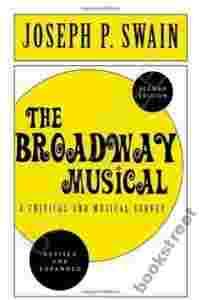|
To see a Broadway musical is to experience how a
drama, using melody, harmony, and rhythm, evokes the
emotion needed to perpetuate a story line. Without
music, many of these plays would not succeed, failing to
convey the intended message. This new edition of Swain's
classic text, winner of the 1991 ASCAP Deems Taylor
Award, reveals how a musical drama achieves plot
movement, character development and conflict through
strategic placement of song and music in 20 musical
plays. Unlike critical literature that has simply
explored theatrical style and production histories, this
survey focuses mainly on the power of music. Illustrated
with more than 150 musical excerpts and essays, Swain
includes the latest research and viewpoints of
contemporary critics, offering insight into dramatic
expression and how renowned composers including Jerome
Kern, George Gershwin, Jerry Bock, Stephen Sondheim and
Andrew Lloyd Webber influenced the Broadway musical.
This provides insights into the many impressive musicals
to hit the stage between the years of 1927 and 1987,
illuminating how specific revisions to productions such
as Showboat and, Oklahoma! forever changed their
popularity.Learn how music is used as a symbol for
psychological or emotional action from Shakespearean
drama's such as Kiss Me, Kate and West Side Story, to
more current dramas including Godspell, A Chorus Line,
and Jesus Christ Superstar. Replete with a never seen
before essay on Les Miserables, this edition also
includes an expanded epilogue highlighting the phenomena
behind Miss Saigon and Phantom of the Opera,
''megamusicals'' that changed the direction of the
Broadway tradition. For professors of dramatic arts and
people interested in Broadway musicals, theater, popular
music and opera. |
|

